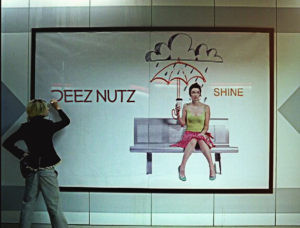If you’re a seasoned internet user, you’ve likely witnessed the cyclical online debates about the “worst song ever.” Not long ago, social media feeds were flooded with discussions sparked by articles dissecting Starship’s “We Built This City,” often cited as the epitome of musical awfulness. This sparked a wave of counter-arguments, with everyone chiming in to nominate their candidate for the ultimate musical nadir. This article joins that very debate, but with a specific target in mind: Daniel Powter’s ubiquitous hit, “You Had a Bad Day” song.
To truly judge a song’s quality, or lack thereof, we need a framework. For a song to be considered truly bad – not just mediocre or disliked, but genuinely awful – it must, in my estimation, commit three cardinal sins of songwriting. These are: triteness, repetitiveness, and, most damningly, laziness. While triteness and repetition alone don’t automatically condemn a song – think of the simple yet powerful messages in “All You Need Is Love” or the rhythmic mantra of “We Shall Overcome” – it’s the toxic combination of these elements with a palpable lack of effort that truly sinks a song to the depths.
Applying these criteria, even the much-maligned “We Built This City” surprisingly holds up somewhat. While its chorus might be repetitive, it doesn’t feel mindlessly looped. The lyrics, though arguably nonsensical, aren’t exactly trite. And, perhaps shockingly, the song doesn’t scream of laziness. You get the sense that considerable effort, however misguided, went into its creation. This might be a horrifying realization, but it’s enough to spare it from the “very worst” label.
 the-reason-hoobastank
the-reason-hoobastank
Image alt text: Hoobastank band image, relevant to discussion of “The Reason” song as a potentially bad song example.
Are there other contenders for the title of “worst song”? Absolutely. Hoobastank, for instance, makes a strong case simply by choosing the name “Hoobastank” for their band. Their hit, “The Reason,” while competently played, is undeniably trite. It lazily rehashes the cliché of “you give my life meaning,” offering absolutely nothing new or insightful. The opening line, “I’m not a perfect person,” feels like a preemptive excuse for the banality to follow. However, aside from the questionable bridge with its repetitive “And the reason is YO! And the reason is YO!” (yes, “yo,” despite it being written as “you”), the song is structured adequately and avoids excessive repetition. While “The Reason” is far from a masterpiece and certainly guilty of some of these sins, it doesn’t quite reach the “worst of the worst” echelon.
Rachel Platten’s “Fight Song” also flirts with awfulness. It leans heavily on repetition, though perhaps not to an egregious degree. While not inherently trite in its “I’m a fighter” theme, it does suffer from a significant dose of musical laziness. Blatantly derivative of earlier empowerment anthems by artists like Christina Aguilera and Kelly Clarkson, “Fight Song” feels like a paint-by-numbers, girl-power anthem that lacks genuine anthemic power and pales in comparison to its inspirations. More damningly, it’s simply bland and easily mocked. As proof, consider this instant parody: “This is my fight song, it really bites song, musical blight so-ong.” Even a spontaneous, off-the-cuff parody highlights the song’s weaknesses. Yet, “Fight Song” also doesn’t fully embody all three sins to the necessary degree to be crowned the absolute worst.
This brings us, finally, to Daniel Powter’s “Bad Day,” or as we’re focusing on, the “You Had A Bad Day Song.” It’s important to clarify: this critique isn’t directed at Powter himself. He delivers the song with as much conviction as one can muster, given the material. The true culprits are the songwriting trio – Asher Paul Roth, Oren Yoel Kleinman, and David Anthony Appleton – who collectively crafted this sonic misfire. In this sense, “Bad Day” mirrors the collaborative, committee-driven creation of “We Built This City,” suggesting that sometimes, too many cooks spoil the broth, especially when the broth is musical.
The “you had a bad day song” is profoundly trite. Its core message boils down to a simplistic, almost insulting platitude: “If you had a bad day, just do things to forget you had a bad day.” Groundbreaking stuff, right? It’s advice so basic, a child could have written it. Fake it ’til you make it. Stuff happens. Kick some leaves. The lyrical depth is akin to a motivational poster in a dentist’s office.
Adding insult to injury, “Bad Day” had the misfortune (for us, the listeners) of being released around the same time as James Blunt’s “You’re Beautiful.” “You’re Beautiful” could have been a serious contender for this “worst song” title, but it at least possesses a slight degree of variation. Credit where credit is due: Blunt, while ladling on the emotional melodrama, manages to vary the spoonfuls. “You Had a Bad Day” song, however, embraces repetition with open arms, particularly in its relentless chorus:
‘Cause you had a bad day
You’re taking one down
You sing a sad song just to turn it around
You say you don’t know
You tell me don’t lie
You work at a smile and you go for a ride
You had a bad day
You’ve seen what you like
And how does it feel for one more time
You had a bad day
You had a bad day
Had a bad day
Awwww-eee-ooo
Had a bad day
Awwww-eee-ooo
Had a bad day
Awwww-eee-ooo
Had a bad day
Awwww-eee-ooo
Had a bad day
 v0017240_posterframe
v0017240_posterframe
Image alt text: Daniel Powter “Bad Day” music video still, highlighting the song’s visual representation.
The chord progression throughout the “you had a bad day song” is the epitome of musical laziness. It’s a monotonous, plodding sequence, akin to a wounded animal dragging itself across a highway. This repetitive musical foundation amplifies the lyrical repetition, embedding the phrase “You had a bad day, You had a bad day, You had a bad day, You had a bad day” into the listener’s brain long after the song ends, enhancing the feeling of auditory torture. It’s also worth noting the sonic similarities between “Bad Day” and “The Reason,” both relying heavily on major chords. While I’m not suggesting direct plagiarism, there’s a shared shallowness, a mutual lack of lyrical, musical, and emotional substance.
Fundamentally, “Bad Day” is a piano ballad, and piano ballads often carry unfair baggage – perceived as maudlin, overly conventional, and ponderous. Musical giants like Billy Joel, Elton John, Ben Folds, and Joe Jackson, among countless others, have demonstrated the piano ballad’s potential for brilliance and innovation. The instrument itself isn’t the issue; it’s the execution. However, the sheer volume of poorly written piano ballads, like “Bad Day,” contributes to this negative stereotype.
Ideally, a song as creatively bankrupt as “You Had a Bad Day” song should have faded into obscurity long ago. Yet, it persists. Trapped in the purgatory of phone hold music, elevator soundtracks, and waiting room playlists worldwide, “Bad Day” remains stubbornly present. It’s a constant, unwelcome companion. One can only pray for a musical savior, a song powerful enough to rescue us from the bad day induced by simply having to endure Daniel Powter’s “Bad Day” yet again.
